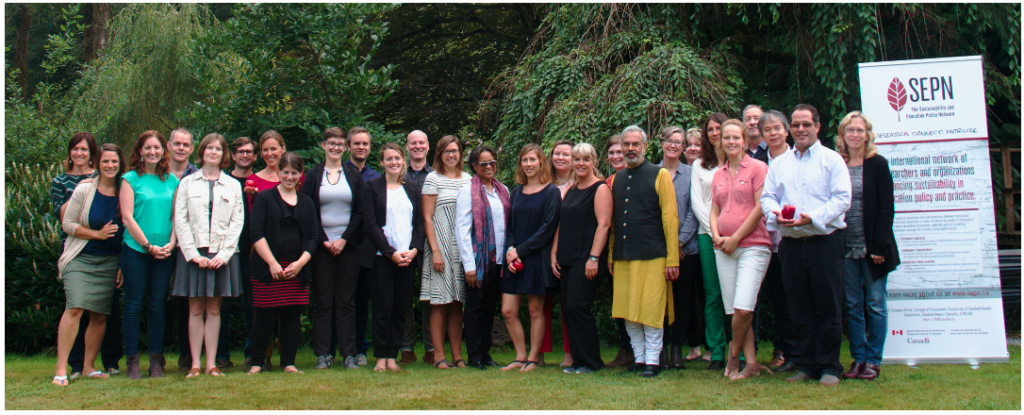We are pleased to announce the formal launch of the Monitoring and Evaluation of Climate Change Education (MECCE) project. MECCE launched with a successful virtual Inception Meeting on September 17, 2020, which was attended by over 70 delegates from around the world, who discussed furthering the project’s ambitious goals in its inaugural year.
MECCE’s goal is to advance climate literacy and action through improving the quality and quantity of climate change education, training, and public awareness globally. The project’s over 80 international partners and collaborators include the United Nations Framework Convention on Climate Change (UNFCCC), the United Nations Educational, Scientific and Cultural Organization (UNESCO), the UNESCO Global Education Monitoring Report, the Intergovernmental Panel on Climate Change (IPCC), and Environment and Climate Change Canada. MEECE’s leadership includes Director Dr. Marcia McKenzie; Project Manager Ms. Nicola Chopin; and project component leads, Drs. Heila Lotz-Sisitka and Aaron Benavot.

MECCE was developed to respond to recent mass calls for education and action as the climate crisis is fuelled by ongoing climate change denial and inertia. The importance of climate change education and communication is recognized as a priority in the Paris Agreement and the United Nations 2030 Agenda, including through the Sustainable Development Goals. In 2018, an Intergovernmental Panel on Climate Change (IPCC) Special Report warned we had only 12 years to prevent catastrophic climate change and spotlighted education as essential.
However, while fundamental to overcoming climate denial, increasing climate literacy, and supporting climate action, we lack clear understandings of quality climate change education and communication globally and across K–12 and higher education, government, civil society, business, media, and communications sectors. We also lack global benchmarks and targets to support intergovernmental processes to increase climate change education across sectors.
MECCE responds to these current gaps in quality and quantity through its core research activities, which include (1) building a repository of case studies from around the world to generate novel understandings of quality climate change education and communication, and (2) developing new monitoring indicators and datasets to support improved global climate change target-setting and monitoring in order to increase climate change education and communication.
MECCE’s world-class team also brings the extensive reach required to impact intergovernmental and national policy makers, and education and communications audiences with its research outputs. MECCE will inform intergovernmental negotiations and reporting, and deliver unique learning products such as Learning Institutes, an open access Data Visualization Platform and Digital Library, multilingual materials and Video Modules, Indicator Fact Sheets, and Guidelines for Educators and Negotiators.
Ultimately, MECCE’s key impacts will include accelerating intergovernmental target-setting and progress on climate change education and communication, improving policy and practice across sectors and countries, increasing climate leadership globally, and closing global gaps in climate literacy and action.
MECCE is funded by a $2.5 million Partnership Grant from the Social Sciences and Humanities Research Council of Canada, with an additional $2 million+ in partner contributions. MECCE builds on previous research-based partnership work conducted by the Sustainability and Education Policy Network (SEPN).
For more information on MECCE, please visit www.sepn.ca/mecce, follow @SEPNetwork on Facebook and Twitter, and please tag #mecce and @SEPNetwork in relevant social media content.
 Loading…
Loading…

Partners and Collaborators
| Advisory Committee Intergovernmental Panel on Climate Change (IPCC) United Nations Educational, Scientific and Cultural Organization (UNESCO) UNESCO Global Education Monitoring Report United Nations Framework Convention on Climate Change (UNFCCC) Academic Partners Freie Universität Berlin Monash University Rhodes University University at Albany—State University of New York University of Cambridge University of Melbourne University of Saskatchewan Academic Collaborators Columbia University Stanford University Tokai University Universität Leipzig Université du Québec à Montréal University of Bristol Universidad Veracruzana Wageningen University | Organizational Partners Canadian Commission for UNESCO Centre for Environment Education Climate Action Network Environment and Climate Change Canada Foundation for Environmental Education International Association for the Evaluation of Educational Achievement International Association of Universities International Institute for Sustainable Development North American Association for Environmental Education Sulitest Sustainable Development Solutions Network Swedish International Centre of Education for Sustainable Development UNESCO International Bureau of Education UNESCO International Institute for Information Technologies in Education Organizational Collaborators Association for the Advancement of Sustainability in Higher Education Climate Outreach Environmental Association for Universities and Colleges Manitoba Education National Oceanic and Atmospheric Administration UNFCCC-Education, Communication and Outreach |
